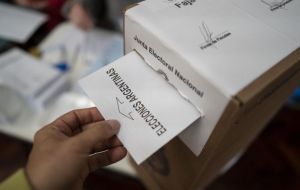MercoPress. South Atlantic News Agency
Macrists win most districts in Argentina's primary elections
 Alberto Fernández said he had “listened carefully” to the message from the polls
Alberto Fernández said he had “listened carefully” to the message from the polls  If Sunday's results are anything to go by, the FdT would lose numerous Lower House seats, but more important than that, it would lose a Senate majority
If Sunday's results are anything to go by, the FdT would lose numerous Lower House seats, but more important than that, it would lose a Senate majority Argentina's ruling Frente de Todos (FdT) coalition Sunday took a heavy blow by losing the Open, Simultaneous and Mandatory Primary (PASO) elections to the opposition Juntos por el Cambio (JxC) alliance of former President Mauricio Macri in most districts nationwide.
Turnout was below 70%, according to preliminary data.
President Alberto Fernández lost most of the people's support after video footage and pictures of him celebrating birthday parties at the Olivos residence while he mad mandated the rest of the population to isolate to avoid catching the SARS-Cov-2 virus came out.
JxC easily won the Autonomous City of Buenos Aires (CABA) but also the Province of Buenos Aires, where Vice President Cristina Fernández de Kirchner's dauphin and former Economy Minister Axel Kicillof is governor.
The FdT ticket led by Victoria Tolosa Paz trailed JxC's combined votes of pre-candidates Diego Santilli and Facundo Manes. Tolosa Paz and Santilli will now run against each other in November. Sunday's elections determine who may run for Congress in the November 14 polls.
Other dfistricts where JxC won were Córdoba, Santa Fe, and Mendoza, as well as traditional Peronist provionces such as Entre Ríos, Chaco, La Pampa, Chubut, and Kirchnerism's home land of Santa Cruz. The FdT won in Tucumán, Formosa, La Rioja and San Juan. In total 15 districts were for JxC, 7 for FdT and two (Río Negro and Neuquén) for provincial parties with no nationwide representation.
President Fernández admitted, “we must have something wrong for people not to back us up.” Nevertheless, he remained confident things could be reversed by November. The President also said he had “listened carefully” to the message from the polls.
Most Argentinians certainly disapproved of his handling of the coronavirus pandemic (over 112,000 deaths and the longer lockdown in the world), inflation at 51% in the last year, school desertion and poverty on the rise easily account for Sunday's results.
Despite previous fears for possible delays due to the pandemic protocols, 60% of the voting tables had been counted by 9.30 pm.
Former Buenos Aires Governor María Eugenia Vidal said the outcome was a mandate to stop “outrage and abuse” on behalf of Fernández. She even spoke of “the rebellion of the poor who no longer want to be slaves of Kirchnerism.”
If Sunday's results are anything to go by, the FdT would lose numerous Lower House seats, but more important than that, it would lose a Senate majority, which is likely to make governance an uphill task.
The outcome may also open a new chapter in interpersonal relations between CFK and Alberto Fernández, who is undeniably the cause of this defeat.
On the other hand, these results have boosted Buenos Aires Mayor Horacio Rodríguez Larreta's quest for the presidency in 2023. The JxC winning candidates were the ones he himself had endorsed, against those favoured by party chairwoman Patricia Bullrich. At JxC they still think they have won and not that the Olivos scandal sentenced FdT'S loss against any opposition.
Rightwing Economist Javier Milei with his “antipolitical” speech came in third in CABA with more than 13 % of the votes, which would secure him a Congressional seat in November. Milei spoke of “lions that are coming,” then he repudiated “the political caste” that, according to him “will have to go” and sang praise for a neoliberal model.
Tolosa Paz obtained 33% of the votes for an FdT which had garnered 52% support in 2019. With slightly over 80% of the votes counted nationwide, Fernández's defeat was unsurmountable.
Sunday's elections also saw the Radical Civic Union of former President Raúl Alfonsín gain some independence from the JxC coalition under which it has been running recently at the national level when former Mendoza Governor Alfredo Cornejo raked in almost 44% of the province's votes.
Sunday's elections were held under sanitary protocols due to the COVID-19 crisis.




Top Comments
Disclaimer & comment rules-

Read all commentsHallelujah!
Sep 13th, 2021 - 04:30 pm 0Commenting for this story is now closed.
If you have a Facebook account, become a fan and comment on our Facebook Page!